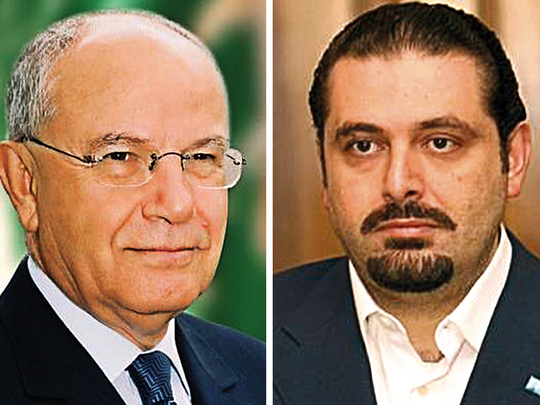
Beirut: A new parliamentary bloc is emerging in Lebanon, positioning itself the “Sunni Opposition” to Prime Minister Sa’ad Hariri and his Future Movement.
It includes 10 MPs, who are all allies of the Hezbollah-led March 8 Coalition, demanding a minimum of one — possibly two — cabinet seats in the forthcoming Hariri government. Hariri has so far turned them down, saying that their bloc is composed of 6 not 10 MPs, making them ineligible for cabinet representation.
Traditionally, his Future Movement, which won 20 seats in the present parliament, are considered the representatives of Lebanese Sunnis, a monopoly that the new bloc is trying to break. According to a present formula put forth by President Michel Aoun, every four parliamentarians are entitled to one seat in cabinet.
“This means we ought to get 2.5 ministers” says ex-defence minister Abdul Rahim Murad, an MP since 1990 who was recently re-elected for the Sunni seat in the Bekaa Valley.
Speaking to Gulf News, he said: “Hariri is saying we are 6 not 10. Good, then this means we get one minister.” Murad, who is also a former minister of higher education who owns and runs the Lebanese International University, held a meeting for the Sunni Opposition at his home in Beirut last June.
Two prominent Sunnis did not attend, being ex-prime minister Najeeb Mikati, who won four seats in Tripoli, and recently elected Beirut MP Fouad Makhzoumi, an independent tycoon. Both said they don’t want to be labeled as “Sunni politicians” claiming that they were speaking for all Lebanese.
Present at Murad’s home were Beirut MP Ali Tarabulsi, Tripoli MP Faisal Karami, Bekaa MP Al Waleed Sukariyeh, Danniyeh MP Jihad Al Samad, and Kassem Hashem, a dentist-turned politician from the Lebanese South. The Sunni politicians met again at the home of Faisal Karami on July 5.
Murad added: “Traditions say that the Prime Minister-elect needs to hold consultations with all major parliamentary blocs before he forms his government. Based on those consultations, he decides. All blocs have stressed that Prime Minister Hariri needs to create a national cabinet that is all-inclusive, based on the results of last May’s elections.” He stressed, “Forty per cent of Lebanese Sunnis voted for MPs outside Hariri’s Future Movement. They need to be heard and need to be represented.”
The new bloc is trying to name Karami, a former minister of youth, in the Hariri cabinet. Karami, aged 46, hails from a prominent hereditary family in Tripoli that was marginalised by the rise of the Hariri family, first by Rafik Hariri in the 1990s and more recently by his son Sa’ad. Karami’s grandfather Abdul Hamid had been Prime Minister of Lebanon back in 1945 and so were his father Omar and uncle Rashid, who was killed in 1988 by Samir Geagea of the Lebanese Forces (LF), a present ally of Prime Minister Hariri.
Lebanese political analyst Nidal Al Sabee explained to Gulf News, saying: “Hezbollah and its allies are pressuring the prime minister to name a Sunni minister from their bloc, while Saudi Arabia is pushing Hariri in the opposite direction. His mission will not be easy, and the crisis of cabinet formation will last long, unless there is a breakthrough in the region, with understandings that shelter Lebanon from all crises stretching from Yemen to Dara’a.”
According to Al Sabee, “Hezbollah is saying: if the Lebanese Forces is going to get three ministries in the next government, based on their 15 seats in Parliament, then 10 MPs in the Sunni Opposition are entitled to two seats as well.”
“We are demanding that they stop alienating the people who voted for us” added Murad. “We cannot ignore 40 per cent of the Sunni community in Lebanon. The Shiites are represented by two blocs in Parliament. And so are the Druze, between Walid Junblatt and Emir Talal Arslan. Why can’t the Sunnis get two blocs as well?”
Hariri is not too fond of Faisal Karami, who was forced on the Mikati cabinet back in 2011-2014 by Hezbollah, prompting Future Movement media to coin him the “sixth Shiite minister.” For now, Hezbollah is insisting on making him minister once again, raising the bar of its demands, saying if Hariri does not comply, it will request the naming of an Alawite minister and an Assyrian Christian as well, representing “minorities.” This is a demand that Hariri cannot possibly meet, which might force him to unwillingly accept one minister, instead of three new ones from the March 8 Alliance.
“Until now, they are refusing to listen to us, although we showed them our goodwill” concluded Murad. “If this continues, we go into the opposition and reach out to Lebanese public opinion. We might even go to the opposition even if we get one minister in the cabinet. We will speak to the Sunnis—all the Sunnis—but especially those on whom injustice is being practiced, who are being left with no representative in the government. We will create a ‘super opposition’ that will open all files, from corruption to the chronic waste crisis, public debt, the refugee crisis, and so on.”












